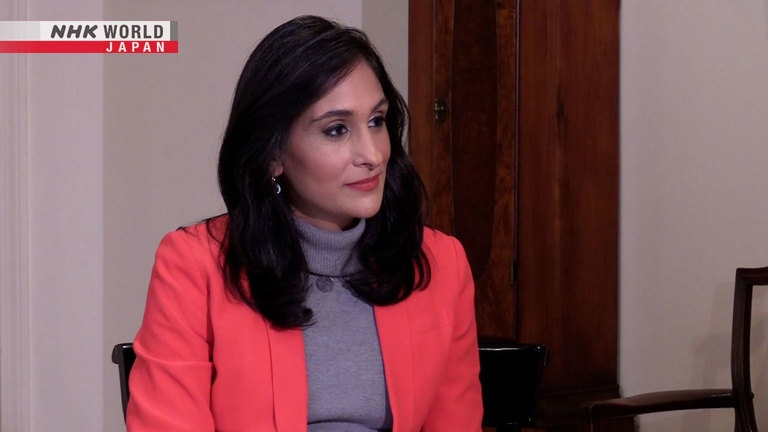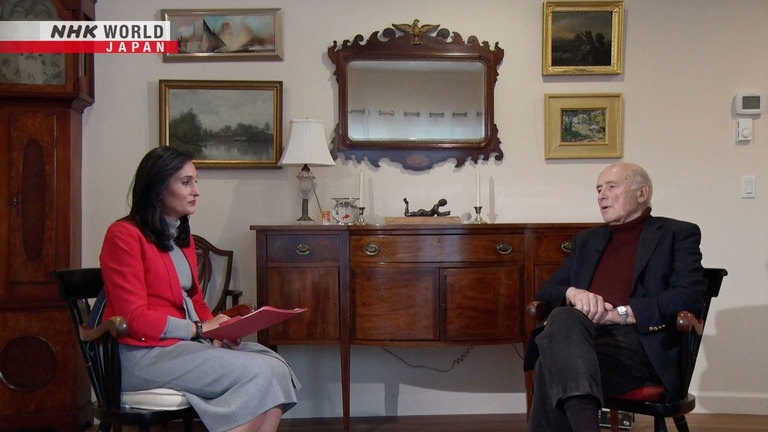Japan-US Alliance amid Indo-Pacific Power Shifts: Joseph Nye / Emeritus Professor, Kennedy School of Government, Harvard University
As China and India increase their presence in the Indo-Pacific, the regional power balance is shifting. The US and Japan have been deepening their security alliance and strengthening cooperation with countries in the region to adapt to the changing dynamics. What is next for the Japan-US alliance? How can the two nations, with Indo-Pacific countries, bring stability to the region? American foreign policy expert and former US Assistant Secretary of Defense Joseph Nye offers his insights.

Del Irani
DEEPER LOOK Host

Del Irani (left), Joseph Nye (right)
Transcript
Hello, and welcome to DEEPER LOOK, coming to you once again from Cambridge Massachusetts near Boston.
I'm Del Irani; it's great to have your company.
In April of this year, Japanese Prime Minister Fumio Kishida is scheduled to visit the United States.
Over the past few years, the US and Japan have continued to strengthen their security alliance,
as China expands its military presence in the Indo Pacific region.
So just how will China's growing presence influence the security of the region?
And where is the strategic alliance between these two nations headed, as the power balance in the region shifts?
These are some of the questions I'm going to put, once again, to Joseph Nye,
Emeritus Professor and former Dean of Harvard's Kennedy School of Government.
Dr. Nye, welcome back to the program; great to have you with us again.
Nice to be back.
You were the Assistant Secretary of Defense under the Clinton Administration.
So, you really have a first-hand experience.
In terms of back then, could you have foreseen the fact that China would expand its military the way it did?
When I first went into the government, we did an intelligence estimate on what was going to happen to the future of China,
and what was gonna happen to the future of East Asia.
And I thought, well, then the simple arithmetic of having three powers in Asia,
the US, China, Japan, it was better to be part of the two that part of the one.
And that's why I place particular emphasis on reaffirming the U.S.-Japan Security Treaty.
Because from that position, we'd be better - we meaning the US and Japan - we'd be better positioned to deal with a rising China.
So, I think that issue of a rising China was something that I was aware of, and I think a number of others were aware of.
And one of the things you did, as you briefly touched on,
is you really helped define that U.S.-Japan Alliance on for decades, through your contribution to the "Armitage-Nye" reports.
In terms of your assessment today, how do you see the U.S.-Japanese Alliance, and what can be done to strengthen it?
Well, I think the U.S.-Japan Alliance is the bedrock for stability in the region,
as Clinton and Prime Minister Hashimoto declared in Tokyo in 1996.
And remember, that was the period when people said the Cold War is over,
and the U.S.-Japan Security Treaty is a relic of the Cold War; we don't need it.
And, I think, what I was trying to say: no, the U.S.-Japan Treaty, the security relationship is essential to stability.
And I think from that period, when both people in Tokyo and in Washington were talking about
discarding the treaty as a Cold War relic, to today, it's just... it's a different world.
And I think the U.S.-Japan Alliance is stronger than ever.
How would you assess the way US, Japan are working together to, I guess, counterbalance China's influence or deal with China?
Well, I think, again, the picture that we had in the Clinton administration of a strategy for the region,
was not to isolate China, but to reaffirm and strengthen the U.S.-Japan ties.
And then for both of us to welcome China into the international community, economically and politically.
And I think, by the period of late Obama, so about 2015 or 2016, there was a feeling in Washington that China had not played fair.
It was stealing intellectual property by cyber means, it was giving subsidies to state-owned enterprises,
which meant there wasn't fair trade, because these countries are subsidized.
When China built these artificial islands in the South China Sea,
Xi Jinping had told Obama that he would not militarize them, and yet he did.
So, people were getting pretty unhappy with China, even before Trump.
Trump comes in...
I sometimes say it was like... Trump was like a little boy who finds a fire and pours gasoline on it; so it all flares up.
But if you ask who lit the fire, I think was lit by the Chinese.
What can Japan do on their side to deal with China's growing presence and influence in the region?
What's your advice for Japan? And then what's your advice to the US?
Well, I think my advice to Japan and the US is the same, which is: stick together.
If you take the combined economies of the US and Japan, they greatly outweigh China.
And if you look at Japan and the US militarily, the Japan-Self Defense Force may have limits under the Constitution,
but it's still a very impressive capability.
And if you take Japan and the US together in military terms, they greatly outweigh China.
So, my advice to Washington, to Tokyo is: stick together, and if you do, you will prevail.
Let's start with the tensions between China and Taiwan.
What can the U.S.-Japan Alliance do to help defuse them?
Well, I think the Taiwan issue is probably the greatest tinderbox, if you want, or possible source of conflict in the region.
We've made very clear to China and to Taiwan, that we support the status quo.
And I think the US has to keep the "One China" policy; it's worked for 50 years.
It's... sometimes people call this "kicking the can down the road."
But who knows in future generations what the politics will be inside China and inside Taiwan?
The main thing is to avoid conflict in the meantime.
And I think that advice goes to both Japan and the US.
I mean, support for Taiwan in terms of trade and economics,
and enough military assistance so that China can't coerce them into unification, I think that makes sense.
How would you assess the Biden administration's current handling of the Taiwan?
Uh, basically, I think the Biden people have it about right.
I mean, the President has sometimes said that we would defend Taiwan.
And the White House has always said that doesn't represent any change.
Let's move to the topic of nuclear development.
I'm going start with North Korea, which of course, their nuclear development program has been posing a significant threat,
not just to the region, but of course, to the US as well.
What can the US and Japan do to get North Korea back in the fold, if that's possible at all?
Well, I frankly doubt that Kim Jong Un is going to give up nuclear weapons.
So, I think we're... while we can say that we don't accept nuclear weapons to North Korea,
we have to be realistic that they're not going to be removed quickly.
And within that framework, then, we have to make sure that our deterrence of the aggressive actions that Kim might be taking,
it might be tempted to take because of the of the nuclear weapons, are more than deterred by American capabilities.
And it's also important that it be clear to Kim that he cannot divide the US and South Korea, or Japan and South Korea.
And I think we've seen progress in the last year or so on making it clear that
the triangle of US, Japan and South Korea is not going to be divided, as Kim has tried to do.
What about China? China has also said to be increasing their nuclear capacity;
no clear signs of, you know, joining reduction talks.
You previously have written a book called "Nuclear Ethics."
With that in mind, what advice would you be giving to leaders: Japan, South Korea, the US?
Well, what I wrote at that time, and I still hold the views,
is that we want to have nuclear weapons in the background, but not the foreground.
I think we're not capable of getting rid of nuclear weapons.
The danger is that when Xi Jinping decided to give up the Chinese position of what's called "finite deterrence,"
where with 200 or 300 weapons, I guess today it is probably about 400, were enough to deter the United States,
and instead feels that he has to develop something like 900 or more;
I think those are steps in the wrong direction.
What does the US and Japan do about that?
Well, I think we have to persuade him that stability talks are in his interest.
In other words, that as he moves in this direction, he runs the risks of people miscalculating, and that's bad for China;
it's bad as well as for the US or Japan.
The power dynamics in the Indo-Pacific are shifting.
Of course, China is one player.
Another player is India, whose presence is growing ever so strong.
What impact is this having on the U.S.-Japan Alliance?
And why is this alliance important now, more than ever?
Well, if you look at India, its role has greatly increased in Asian-power terms.
It's now outstripped China in terms of population.
And worse, China's population has peaked, and China's labor force peaked in 2015.
India's population and labor force is increasing.
So, India is becoming a heavier weight, if you want, in East Asia,
and in addition, India is very worried about China.
The Indians don't want any formal alliance.
You're never going to have a NATO for Asia.
But you can do things like the QUAD, where the leaders of India, Japan, US and Australia
meet to discuss the stability in the East Asian region.
And I think India is going to play a significant role.
The Chinese have to realize they're no longer the only large power in Asia.
So, with that in mind, what should the US do now in alliance with Japan and other countries, perhaps India, as you mentioned too,
in order to maintain its leadership role, and really be the driving force behind strategy in the Indo-Pacific region?
Well, I think that the key is to maintain our alliances.
You mentioned earlier the "Armitage-Nye" reports...
And what we've tried to argue since the first one in the year 2000,
is that the U.S.-Japan Alliance really is the bedrock of stability in the region.
And over time, we have become more efficient in working together.
People talk about the importance of moving toward more jointness in our command structures, for example,
but the main point is the popular realization and the political realization, that if we stick together, we're going to prevail.
And if we fall apart, we're going to make it easier for the other side.
Dr. Nye, thank you so much for your time.
We appreciate you joining us on the program once more.
Well, it's my pleasure. Thank You!
For nearly 80 years since the end of World War II,
the U.S.-Japan Alliance has remained a key pillar in the regional security order of Asia.
As power dynamics shift in the Indo-Pacific,
regional players and the world will be watching just how this alliance can continue to bring stability to the region.
I'm Del Irani; thanks for your company.
I'll see you next time on DEEPER LOOK.